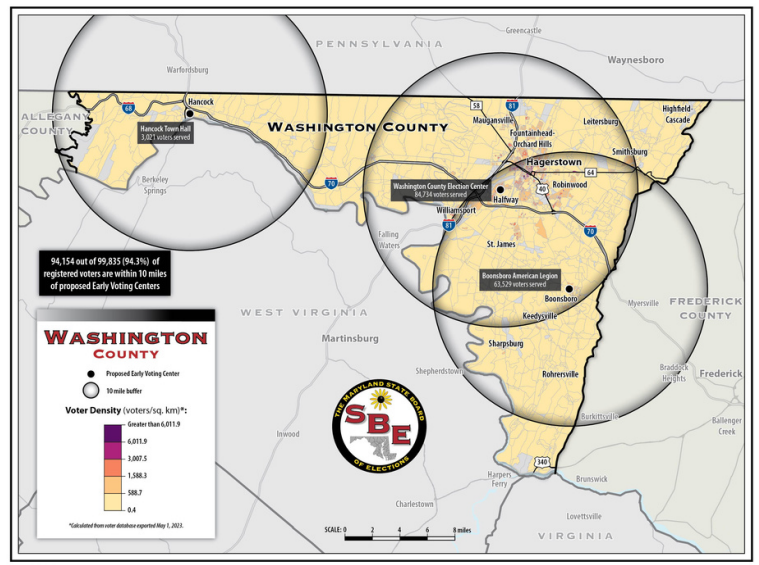Introduction Washington County
One of Washington County’s planned early voting locations was denied by the Maryland State Board of Elections in a recent ruling, sparking discussion over voting accessibility and diversity. This blog article examines the reasons for the rejection, the county’s initiatives to resolve the matter, and the opinions that shaped the choice.
A Rejected Proposal and the Path for Enhancement
Elections authorities in Washington County had planned to open an early voting location in Hancock for the 2024 election. The Maryland State Board of Elections, however, turned down this location due to worries that it would deny voters their rights, especially those who come from communities of color.
The Washington County elections board chair, Michael Summers, sees the rejection as a chance to do better. He thinks the county can discover a solution that works best for its people if it puts in more effort and solicits feedback from the community. This ruling permits Washington County to reconsider the proposal and maybe develop a new proposal that takes the issues mentioned into account.
Understanding Early Voting Sites and State Regulations
At first, the county had suggested three early voting locations, two of which were to serve a sizable section of the county’s population and were situated in Hagerstown and Boonsboro. The third location, in Hancock, was meant to serve as a backup plan for remote regions. Opponents of a more centrally located library in Hagerstown, who felt it would better serve historically disenfranchised voters, opposed the Hancock site, nevertheless.
When choosing early voting locations, counties are required by state regulations to take into account voting communities that are disenfranchised. In order to guarantee that a sizable section of the populace can readily visit the specified places, these regulations also set forth particular standards depending on population size and proximity to voting centers.
The Advocacy of Angela Batista and Opposition Concerns:

The Washington County Democratic Central Committee head, Angela Batista, fervently promoted the Fletcher Branch of the Washington County Free Library system as the best location for voting. She maintained that the library satisfies all legal standards and prerequisites, providing convenient local access for voters who have previously been denied the right to vote.
In addition to supporters, prominent individuals who opposed the proposed Hancock site included Hagerstown City Councilmember Matthew J. Schindler, Del. Brooke Grossman (D-Washington County), and the Washington County branch of the NAACP. Their worries played a part in the site’s rejection.
State Elections Board’s Position and Demographic Considerations
Yaakov “Jake” Weissmann, a board member, stated that he thought Washington County officials did not have malicious intent when choosing the two sites, even if the state elections board rejected the Hancock site. Although he was appreciative of their efforts, he was hesitant to accuse them of anything.
READ MORE INTERESTING ARTICLES Running to Heal A 9-11 Survivor Alice Yu’s Marathon Journey
The demographic composition of Washington County is 155,590 people, of whom 20% are Black and 20% are Latino or Hispanic. Nearly three out of ten county inhabitants live in Hagerstown, where 27% of the population is Black and Latino/Hispanic.
The Road Ahead
Although Washington County was mandated to have two early voting locations, three were suggested. The county reevaluated its strategy after the Hancock site was turned down. The topic of early voting site selection is still being discussed, with an emphasis on making sure that everyone has equal access to the voting process.
Conclusion
The significance of inclusive and accessible voting venues is highlighted by the denial of Washington County’s proposed early voting facility in Hancock. Even while there are still disagreements and obstacles to overcome, this ruling allows for more discussion and cooperation toward the ultimate objective of giving all eligible voters the chance to take part in the democratic process.
